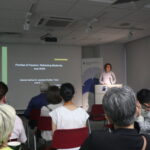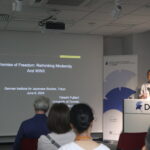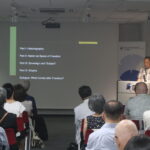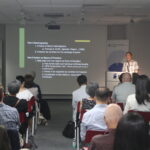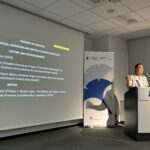
Download
Venue
DIJ (access), onsite only
Co-organizer
This event is part of the Max Weber Foundation event series ‘The Ends of War’

Registration Info
This is a past event. Registration is no longer possible.
DIJ Mailing Lists
Please subscribe below to stay informed about our research activities, events & publications:
Promise of Freedom: Rethinking Modernity and World War II
June 6, 2024 / 6.30 pm (JST)
Takashi Fujitani, University of Toronto
Jordan Sand, Georgetown University (Washington, DC) / Kokugakuin University (Tokyo)
Moderated by Torsten Weber, DIJ
Looking back upon the extra-long twentieth-century that begins in the latter half of the nineteenth century and that continues today, it has become increasingly clear that “freedom” is not necessarily the antithesis of oppression and domination. Instead, as Michel Foucault’s writings and critics of liberalism have shown, “freedom” has too often been the condition for the workings of power. One of the most obvious examples in modern Japanese history of this relationship between freedom and power is the Japanese empire’s promise to free those in the Asia-Pacific from the bonds of Euro-American colonialism and racism. Yet this relation between the promise of freedom and new oppressions—which should not be simply reduced to duplicity—is not peculiar to the period of the Second World War. It has been a recurring theme in modern history throughout the world, including in East Asia and Japan. This talk grappled with this question through the example of Japanese history, including during the Second World War, while discussing the complicity of freedom with the oppressions that have accompanied nationalism, imperialism, colonialism, the “emperor system,” and various forms of social discrimination.
The Q&A session after Professor Fujitani’s talk and Professor Sand’s comments focused on the relation between colonialism and freedom, on the justification of state power, and the significance of the LDP’s political dominance in postwar Japan. The event was fully booked with 50 guests at the DIJ.
Takashi Fujitani is the Dr. David Chu Chair in Asia Pacific Studies at the University of Toronto, where he is also Professor of History. His major works include: Splendid Monarchy (UC Press, 1996); Race for Empire: Koreans as Japanese and Japanese as Americans During WWII (UC Press, 2011); and Perilous Memories: The Asia Pacific War(s) (co-edited, Duke U. Press, 2001). He is editor of the book series Asia Pacific Modern (UC Press) and has held numerous grants and fellowships, including from the John S. Guggenheim Foundation.
Jordan Sand is Professor of Japanese History at Georgetown University in Washington, DC, and Distinguished Visiting Professor at Kokugakuin University in Tokyo. He holds a masters degree in architecture history from the University of Tokyo and a doctorate in history from Columbia University. He is the author of House and Home in Modern Japan, Tokyo Vernacular: Common Spaces, Local Histories, Found Objects,『帝国日本の生活空間』 (Living Spaces of Imperial Japan) and 『破壊と再生の伊勢神宮』(Destruction and Renewal at Ise Shrine). He researches and writes widely on the social and cultural history of Japan and the Asia-Pacific.
